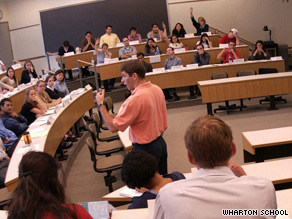
The editor in chief of America, Drew Christiansen, S.J., has forgotten more about Catholic social teaching than I’ve ever known—and he’s not forgotten much. So I urge you to read his commentary below on the pope’s new encyclical on social justice and the economy, Caritas in Veritate. Our former editor, Thomas J. Reese, S.J., also has a good roundup on Newsweek’s On Faith blog. And of course, we’ll be covering in our magazine, in greater depth, the encyclical, in future issues.
But I wanted to meditate a bit on a particular aspect of the encyclical: its implicit critique of capitalism. And I’d like to do so as a graduate of the Wharton School of Business (B.S. Econ, '82) and someone who worked for GE and then GE Capital (1982 to 1988). In other words, as a capitalist, or at least a fan of capitalism, the system I believe is the most efficient distributor of goods and services and wealth.
Benedict’s new encyclical, Caritas in Veritate, is already being spun by more than a few free-market Catholics as an endorsement of the capitalist system, or, likewise, “Nothing here, move along.” I’m always amused that a few of the same Catholics who trumpet the pope’s (either John Paul II's or Benedict XVI's) clearly “countercultural” stances--particularly when it comes to abortion, stem-cell research and other life issues--are so willing to look the other way when the culture being countered is free-market capitalism or rampant consumerism. And if you have any doubt that the pope is offering a critique, read the document.
Certain words recur over and over: solidarity, justice, poverty, common good—all things that capitalism, or at least capitalist thought, has traditionally elided. The market, says free-marketers, will provide for those things through the smooth and efficient operation of the economy. But, as we know, it does not. Just ask the poor. (There are billions to ask, both here and abroad.) Capitalism may be--to paraphrase Winston Churchill on democracy--the worst form of economic distribution, except for all the others that have been tried. I’m still a capitalist, but--as were his predecessors, Leo, Paul and John Paul II--Benedict is absolutely right, and within his “rights,” to offer a strong critique of the capitalist mindset.
Look at just one of B16’s comments. It’s Number 36 in case you want to check.
“Economic activity cannot solve all social problems through the simple application of commercial logic. This needs to be directed towards the pursuit of the common good, for which the political community in particular must also take responsibility.”
That statement would have caused my Econ 101 professor to run screaming from the classroom. Benedict says, in essence, that the market cannot provide for everyone. And, given that it cannot, something else must be seen as an essential value: the common good. There are values other than simply the creation of wealth. And those values must be incorporated into our calculus of what "works." Adam Smith, says Benedict, is only partly right.
Here’s just another area of critique. In classical economics, there will, economists suggest, always be some “residual unemployment,” the result of those workers shifting from job to job. And as for the poor, well, they are not “efficient” in that they are poorly educated or trained, or perhaps they are not diligent in seeking employment, and so their poverty will serve as a goad for them to become better trained, more highly educated or simply more motivated in the future. So both problems—unemployment and poverty—are more or less a given in the free-market system. But no matter, the market will correct them, eventually.
Benedict, as did his predecessors, disagrees:
“The poor are not to be considered a ‘burden’, but a resource, even from the purely economic point of view. It is nevertheless erroneous to hold that the market economy has an inbuilt need for a quota of poverty and underdevelopment in order to function at its best. It is in the interests of the market to promote emancipation, but in order to do so effectively, it cannot rely only on itself, because it is not able to produce by itself something that lies outside its competence. It must draw its moral energies from other subjects that are capable of generating them.”
Being Catholic does not mean being a capitalist. Of course it does not mean being a Communist or a Socialist either. The Catholic church rightly critiques certain gross failings of the capitalist system, not because the system itself is evil or contrary to the Gospel, but because it fails in many respects to maintain the dignity of every human being. When in the Gospel of Matthew, Jesus tells us that we will be judged by how we care for the “least” or our brothers and sisters, he was speaking, primarily, of the poor.
Benedict’s new encyclical reminds us that the caritas that Jesus was talking about is often not provided by capitalism. And so it is appropriate that the church point out this truth, this veritas, whether or not it makes Catholic capitalists, like me, uncomfortable.







